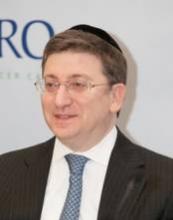BOSTON – The drugs that have revitalized the love lives of millions of aging men may also help preserve sexual function in men undergoing radiation therapy for prostate cancer, investigators reported at the annual meeting of the American Society for Radiation Oncology.
Men who took sildenafil citrate (Viagra) before, during, and for 6 months after radiotherapy for prostate cancer had better sexual function and reported better overall satisfaction than did men who took placebo in a randomized double-blind trial, said Dr. Michael J. Zelefsky, a radiation oncologist at Memorial Sloan-Kettering Cancer Center in New York City.
Men who were also treated with androgen deprivation, however, did not appear to experience a benefit from sildenafil and were excluded from the analysis.
"We believe our study is a very important one, for it demonstrates proof of principle that penile rehabilitation is important in the population of radiotherapy patients treated for prostate cancer, and demonstrates a significant benefit for improved sexual function outcomes," Dr. Zelefsky said at a plenary session.
Studies in animal models have suggested that phosphodiesterase-5 (PDE5) inhibitors such as sildenafil, vardenafil (Levitra), and tadalafil (Cialis) could help to preserve or rehabilitate penile function by protecting the vascular endothelium of the corpus cavernosum of the penis and smooth muscle tissue involved in erections.
Dr. Zelefsky pointed to a European randomized trial showing that patients who had undergone bilateral nerve-sparing prostatectomy and were randomized to vardenafil had improved spontaneous erections compared with placebo-taking controls (Eur. Urol. 2008;54:924-31).
Pretreatment Potency Assessed
The current study enrolled 295 men who had excellent sexual function (defined as a score of 17 or greater on the International Index of Erectile Function 5 [IIEF-5]) and were scheduled to undergo radiotherapy to the prostate with either external-beam radiation (EBRT) or brachytherapy. They were randomly assigned on a 2:1 basis to sildenafil or placebo, respectively.
Sildenafil was given in a 50-mg dose starting 3 days before therapy and continuing out to 6 months. Patients were followed with the patient-derived IIEF-5 (including domains of erectile function, orgasmic function, intercourse satisfaction, and overall satisfaction), International Prostate Symptom Score (IPSS), and a quality of life questionnaire every 3 months for the first year, and then every 6 months up to 2 years.
"Thirty one patients were treated with androgen-deprivation therapy, and when we looked at erectile function scores over time, there were no significant differences or improvements noted with the use of daily sildenafil compared to the placebo group, suggesting that there was no apparent benefit among this cohort of patients. For this reason, we excluded this cohort and turned our attention to a group of patients who did not receive androgen deprivation therapy, leaving us with an evaluable cohort of 142 patients," Dr. Zelefsky said. The analysis included patients who completed surveys before treatment and at least one additional time period.
There were no significant between-group differences at baseline in factors that might affect erectile function, such as smoking history, diabetes, or hypertension.
Overall total IEFF-5 scores were significantly higher among patients in the sildenafil arm at 6 (P = .006), 12 (P=.02) and 24 months (P = .04) after therapy. However, at 24 months, there were significant differences in favor of sildenafil only in the IEFF-5 domains of sexual desire (P = .001) and overall satisfaction (P = .04).
The investigators also noted that the differences between the treatment groups became less apparent beyond 12 months.
Does This Set a New Standard?
The study had a few minor limitations, including variations in treatment, once-daily rather than more frequent dosing, and the lack of information on a relationship or partner effect, but these do not detract from the conclusion, said invited discussant Dr. Thomas M. Pisansky, professor of radiation oncology at Mayo Clinic, Rochester, Minn.
"Nonetheless, this does serve as an additional test of proof of principle of early PDE5 inhibitor use. Does this represent a new standard? I believe that for the time being it certainly does, but additional study is warranted, and that is ongoing," he said.
Dr. Pisansky added that it is incumbent upon radiation oncologists, when evaluating patients for radiotherapy to the prostate, to incorporate a validated instrument of sexual function such as the IIEF-5.
Dr. Zelefsky and a coauthor disclosed receiving grants from Pfizer, maker of Viagra. Dr. Pisansky reported no conflicts of interest.


